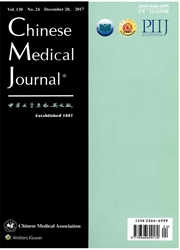

 中文摘要:
中文摘要:
迟了发作的出血性的膀胱炎( LOHC )的 pathophysiology 不当前是很好的背景这研究的 understood.The 目的是在 LOHC 柱子 allogeneic 的致病分析 ailoimmune 原因论造血的干细胞移植( HSCT ) .Methods A 回顾的学习与免疫者相关的 LOHC 在 11 个病人的医药记录上被执行柱子 allogeneic HSCT 。这些病人的临床的特征,治疗,和结果是 analyzed.Results 发作的中部的时间是在 HSCT (范围 16-150 天) 以后的 42 天, HC 的中部的持续时间是 .All 病人与延长 HC 介绍了超过 35 天的 43 天(范围 29-47 天) 。有复活没与倔强的 HC 在尿 post-therapy.Eleven 病人甚至与 CMV 清理回答到抗病毒的治疗的 cytomegalovirus ( CMV )的证据的九个病人收到了 corticosteroids 的低剂量,所有病人走进完全的 remission.Conclusion 我们的数据建议那 alloimmune 损害涉及 HC 的致病在在最不,一些病人和那特定的治疗可能改进出血性的膀胱炎的临床的结果。
 英文摘要:
英文摘要:
Background The pathophysiology of late-onset hemorrhagic cystitis (LOHC) is currently not well understood. The aim of this study was to analyze the alloimmune aetiology in the pathogenesis of LOHC post allogeneic hematopoietic stem cell transplantation (HSCT). Methods A retrospective study was performed on the medical records of 11 patients with immune-related LOHC post allogeneic HSCT. The clinical characteristics, therapy, and outcomes of these patients were analyzed. Results The median time of onset was 42 days after HSCT (range 16-150 days) and the median duration of HC was 43 days (range 29-47 days). All patients presented with prolonged HC for more than 35 days. Nine patients with evidence of cytomegalovirus (CMV) reactivation did not respond to anti-viral therapy even with CMV clearance in the urine post-therapy. Eleven patients with refractory HC received a low dose of corticosteroids and all patients went into complete remission. Conclusion Our data suggest that alloimmune injury is involved in the pathogenesis of HC in at least some patients and that specific therapy might improve the clinical outcome of hemorrhagic cystitis.
 同期刊论文项目
同期刊论文项目
 同项目期刊论文
同项目期刊论文
 Effects of the NK cell recovery on outcomes of unmanipulated haploidentical blood and marrow transpl
Effects of the NK cell recovery on outcomes of unmanipulated haploidentical blood and marrow transpl Partially matched related donor transplantation can achieve outcomes comparable with unrelated donor
Partially matched related donor transplantation can achieve outcomes comparable with unrelated donor High CD4/CD8 ratio in allografts predicts adverse outcomes in unmanipulated HLA-mismatched/haploiden
High CD4/CD8 ratio in allografts predicts adverse outcomes in unmanipulated HLA-mismatched/haploiden First-line therapy for chronic graft-versus-host disease that includes low-dose methotrexate is asso
First-line therapy for chronic graft-versus-host disease that includes low-dose methotrexate is asso Expression profiles of adhesion molecules on na?ve T cells in bone marrow grafts of healthy donors t
Expression profiles of adhesion molecules on na?ve T cells in bone marrow grafts of healthy donors t Superior graft-versus-leukemia effect associated with transplantation of haploidentical compared wit
Superior graft-versus-leukemia effect associated with transplantation of haploidentical compared wit Expression of CD62L on donor CD4(+) T cells in allografts: correlation with graft-versus-host diseas
Expression of CD62L on donor CD4(+) T cells in allografts: correlation with graft-versus-host diseas Characterization of CD3+CD4-CD8- (double negative) T cells reconstitution in patients following hema
Characterization of CD3+CD4-CD8- (double negative) T cells reconstitution in patients following hema Administration of short-term immunosuppressive agents after DLI reduces the incidence of DLI-associa
Administration of short-term immunosuppressive agents after DLI reduces the incidence of DLI-associa Immune-related late-onset hemorrhagic cystitis post allogeneic hematopoietic stem cell transplantati
Immune-related late-onset hemorrhagic cystitis post allogeneic hematopoietic stem cell transplantati Graft-versus-leukemia effects of Wilms' tumor 1 protein-specific cytotoxic T lymphocytes in patients
Graft-versus-leukemia effects of Wilms' tumor 1 protein-specific cytotoxic T lymphocytes in patients The inferiority of G-PB to rhG-CSF-mobilized blood and marrow grafts as a stem cell source in patien
The inferiority of G-PB to rhG-CSF-mobilized blood and marrow grafts as a stem cell source in patien Conflicting impact of alloreactive NK cells on transplantation outcomes after haploidentical transpl
Conflicting impact of alloreactive NK cells on transplantation outcomes after haploidentical transpl Modified donor lymphocyte infusion (DLI) for the prophylaxis of leukemia relapse after hematopoietic
Modified donor lymphocyte infusion (DLI) for the prophylaxis of leukemia relapse after hematopoietic Platelet engraftment in patients with hematologic malignancies following unmanipulated haploidentica
Platelet engraftment in patients with hematologic malignancies following unmanipulated haploidentica Wilms' tumor gene 1 expression: an independent acute leukemia prognostic indicator following allogen
Wilms' tumor gene 1 expression: an independent acute leukemia prognostic indicator following allogen Immunomodulatory strategies for relapse after haploidentical hematopoietic stem cell transplantation
Immunomodulatory strategies for relapse after haploidentical hematopoietic stem cell transplantation Monitoring MRD with flow cytometry: an effective method to predict relapse for ALL patients after al
Monitoring MRD with flow cytometry: an effective method to predict relapse for ALL patients after al Treating donor mice with rhIL-11 and rhG-CSF promotes transplant-tolerance and preserves the effects
Treating donor mice with rhIL-11 and rhG-CSF promotes transplant-tolerance and preserves the effects The effect of HLA disparity on clinical outcome after HLA-haploidentical blood and marrow transplant
The effect of HLA disparity on clinical outcome after HLA-haploidentical blood and marrow transplant Unmanipulated HLA-mismatched/haploidentical blood and marrow hematopoietic stem cell transplantation
Unmanipulated HLA-mismatched/haploidentical blood and marrow hematopoietic stem cell transplantation Individualized Intervention Guided by BCR-ABL Transcript Levels after HLA-Identical Sibling Donor Tr
Individualized Intervention Guided by BCR-ABL Transcript Levels after HLA-Identical Sibling Donor Tr Basiliximab for the treatment of steroid-refractory acute graft-versus-host disease after unmanipula
Basiliximab for the treatment of steroid-refractory acute graft-versus-host disease after unmanipula Diarrhea during the Conditioning Regimen Is Correlated with the Occurrence of Severe Acute Graft-ver
Diarrhea during the Conditioning Regimen Is Correlated with the Occurrence of Severe Acute Graft-ver 期刊信息
期刊信息
